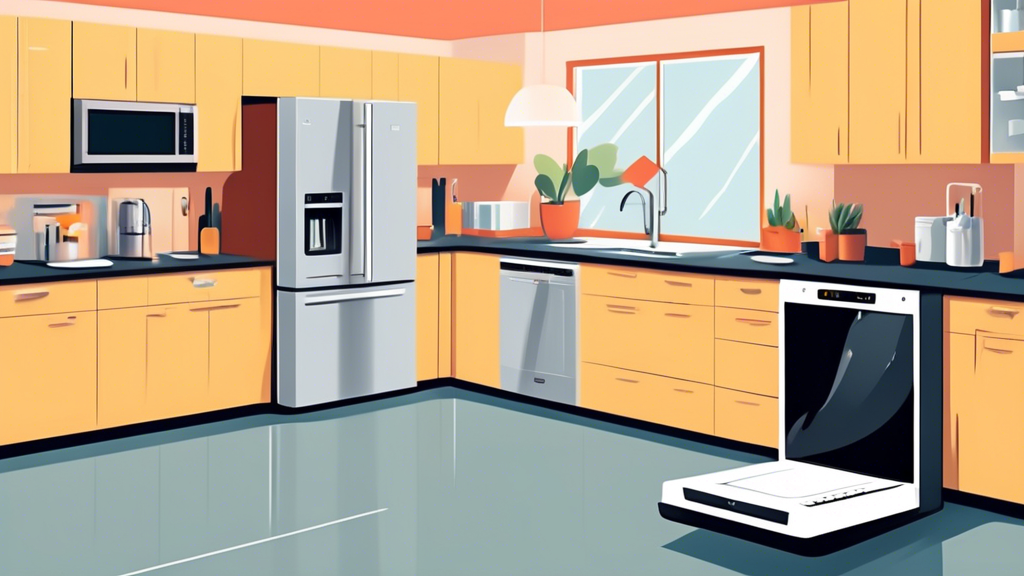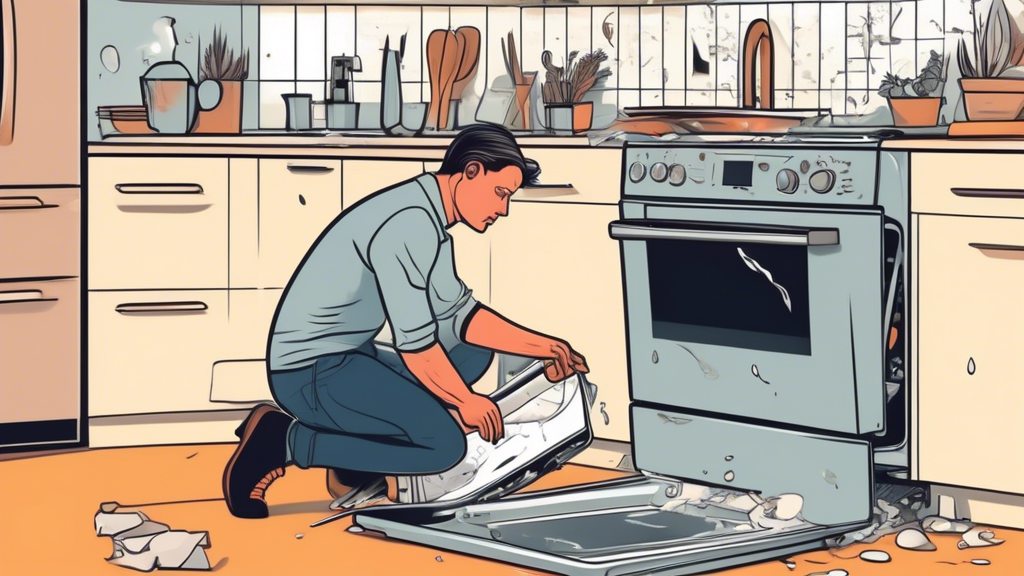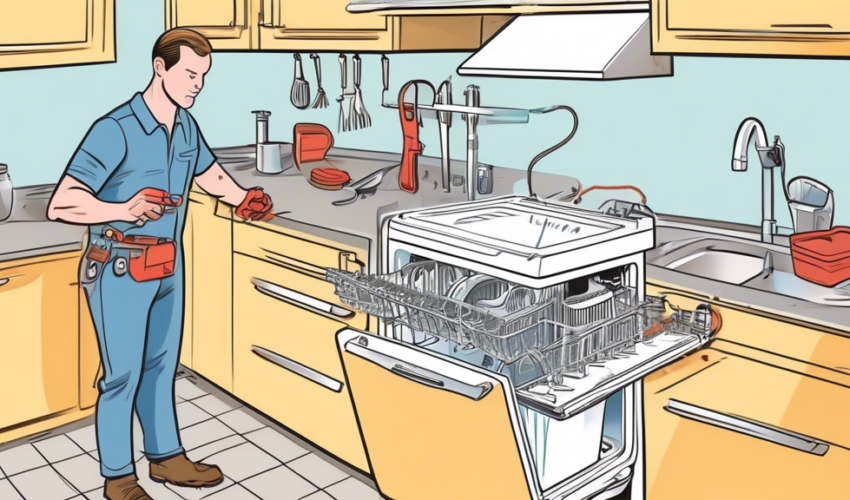If you own a dishwasher, you understand the convenience it brings to your daily life, taking the hassle out of cleaning dishes and allowing you more time for what truly matters. However, like any appliance, dishwashers can encounter problems that disrupt their functionality. This is where having a solid grasp of dishwasher repair becomes invaluable. In this essential guide, we’ll provide you with foundational knowledge about the importance of regular maintenance and timely repairs, along with a comprehensive overview of common dishwasher issues that can arise.
You’ll discover beneficial DIY troubleshooting tips that can save you both time and money before you consider reaching out to a professional. With a focus on practical solutions, we’ll delve into issues ranging from a dishwasher that won’t start to problems with water drainage and ineffective cleaning. Understanding these common challenges will empower you to tackle minor repairs with confidence, ensuring your dishwasher operates at its best. And while some issues may require the expertise of a professional, we’ll also outline key indicators to help you discern when it’s time to call in a repair expert. This guide is designed not just to enhance your appliance knowledge but to promote efficient, cost-effective solutions for maintaining the longevity of your dishwasher. Get ready to dive into the world of dishwasher repair!
I. Introduction to Dishwasher Repair
A. Importance of Regular Maintenance and Timely Repairs
Regular maintenance is crucial for the longevity and efficient operation of your dishwasher. Just like any appliance, dishwashers require care to perform at their best. Routine checks ensure that minor issues do not escalate into major problems that could lead to costly repairs or replacements. By committing to a maintenance routine, homeowners can not only improve the performance of their dishwashers but also save on energy and water costs. Keeping the dishwasher clean and well-maintained enhances its energy efficiency, which directly contributes to lower utility bills.
Timely repairs are equally important. If a dishwasher begins to show signs of malfunction, such as strange noises, leaks, or poor cleaning results, addressing these issues sooner rather than later can prevent further damage. For instance, a small leak may seem inconsequential initially, but if left unattended, it can cause extensive water damage or mold growth in your home. Therefore, understanding the importance of addressing dishwasher repair needs promptly is vital for the well-being of both your appliance and your home.
B. Overview of Common Dishwasher Issues
Common dishwasher issues can range from minor annoyances to significant operational failures. Some of the most prevalent problems include the dishwasher not starting, water not draining properly, and dishes coming out dirty or wet. Other issues may include unusual noises during operation, lingering odors, or water leaking onto the floor. By familiarizing yourself with these common issues, you can easily identify potential problems early on.
Additionally, understanding the causes behind these malfunctions can empower DIY enthusiasts to tackle minor repairs. For example, if your dishwasher is not starting, it could be due to a tripped circuit breaker or a faulty door latch. Recognizing these signs can lead to quicker resolutions and reduce the dependency on professional repair services.
C. Benefits of DIY Troubleshooting Before Calling a Professional
One of the greatest advantages of tackling dishwasher repair issues on your own is the potential for substantial cost savings. Professional appliance repair services can be expensive, and in many cases, homeowners can resolve minor issues with some troubleshooting knowledge and basic tools. DIY troubleshooting not only saves money but also provides a sense of accomplishment and empowerment.
Moreover, engaging in DIY maintenance and repairs can deepen your understanding of how your dishwasher operates. This knowledge can help you become more self-sufficient when it comes to household appliance maintenance. Even if you eventually need to call a professional for more severe issues, being able to perform basic repairs can reduce the frequency of services required and prolong the life of your dishwasher.
When troubleshooting your dishwasher, it’s crucial to start with the simplest solutions. For instance, if your dishwasher won’t start, check the power supply first—this includes ensuring the appliance is plugged in and examining the circuit breaker. If the power supply is intact, further investigation into door latches, control panels, or timers may be needed.
Conducting simple maintenance practices, such as cleaning the filter, inspecting spray arms for debris, and regularly wiping down seals and gaskets, can help ensure optimal performance and longevity. These proactive steps not only contribute to the overall efficiency of your appliance but can also prevent more significant problems from arising in the future.
Understanding the mechanics of your dishwasher and performing regular checks can save you time and frustration down the line. Empowering yourself with troubleshooting techniques is an essential step in the journey of effective dishwasher repair. As you become more adept at identifying and fixing minor issues, you’ll find that you are better prepared to decide when it might be necessary to seek the help of a professional technician. This knowledge is invaluable and will serve you well in maintaining your kitchen appliance for years to come.

Common Dishwasher Problems and Troubleshooting Techniques
1. Dishwasher Won’t Start
If your dishwasher isn’t starting, the problem may lie in the power supply or door latch. Begin by ensuring that the dishwasher is properly plugged into an electrical outlet and that there’s power reaching the appliance. You can test this by plugging in another device, such as a lamp, into the same outlet. If there’s no power, check your circuit breaker to see if it has tripped.
Next, examine the door latch. Dishwashers have a safety mechanism that prevents them from running if the door isn’t securely closed. Inspect the latch for any visible damage. If it appears worn out or broken, it may need to be replaced. Sometimes a simple cleaning of the latch area can resolve the issue, as debris might prevent it from closing securely.
If these checks don’t resolve the issue, resetting the dishwasher can often restore functionality. To reset, turn off the power to the machine at the circuit breaker for about 5 minutes and then turn it back on. This process can help clear electrical faults that might be preventing the dishwasher from starting.
2. Water Not Draining Properly
A common issue in dishwasher repair is when water does not drain effectively, which can lead to standing water at the bottom of the machine. Start troubleshooting by inspecting the dishwasher filters and hoses. Dirty filters can block water from draining, so removing and cleaning these filters is essential. Rinse them under running water and use a soft brush to remove any stubborn debris.
Next, examine the drain hose. Ensure it isn’t kinked or clogged. You can detach the hose and check for blockages by running water through it. If you find debris inside, clear it out to ensure smooth water flow.
If the hose and filters are in good condition, the issue may be the drain pump itself. Sometimes, small food particles can lodge within the pump, obstructing water flow. Disconnect the power, remove the bottom cover of the dishwasher, and inspect the drain pump for any clogs. If you find any, carefully clear them out.
Also, perform a thorough cleaning of the sump area at the bottom of the dishwasher, as this area can often collect food particles and debris over time. Regular maintenance of these components is vital for preventing future drainage issues and ensuring your dishwasher operates effectively.
3. Dishes Not Cleaning Effectively
When it comes to dishwasher repair, one of the more frustrating problems is finding dishes that remain dirty even after a wash cycle. The first step in addressing this issue is to check the spray arms. Clogged spray arms can diminish water pressure and result in poor cleaning performance. Remove the spray arms and inspect them for any food particles or mineral buildup. Rinse them thoroughly under running water and use a toothpick to clean out the spray nozzles.
In addition to inspecting spray arms, it’s crucial to ensure that you are loading the dishwasher properly. Overloading can block the spray arms and restrict their movement, leading to ineffective cleaning. Follow the manufacturer’s guidelines for loading techniques, making sure that dishes are placed in a way that allows water to circulate freely around them. Avoid blocking the spray arms with larger items, and ensure that the detergent dispenser is not obstructed.
Moreover, using the correct type and amount of detergent can significantly impact cleaning efficacy. Be sure to use a detergent that is suitable for your dishwasher and follow the instructions on the package for optimal results. If you are using powdered detergent, check that it is not clumping and dissolving properly during the wash cycle.
Lastly, consider the water temperature as well; ideally, your dishwasher should operate with water that is at least 120°F (49°C). If your home’s hot water heater is set lower than this, it might be time to increase the temperature settings or run the hot water in your sink for a few moments before starting the dishwasher to ensure hotter water enters the machine.
By understanding these common issues and implementing these troubleshooting techniques, you can handle many dishwasher repair problems yourself, ensuring your appliance runs smoothly and efficiently for years to come.

When to Call a Professional for Dishwasher Repair
While many common dishwasher issues can be resolved through DIY troubleshooting, there are times when it’s best to call in a professional for dishwasher repair. Knowing when to reach out for expert help can save you time, prevent further damage to your appliance, and ensure your dishwasher operates at its best again.
Identifying Serious Mechanical or Electrical Issues
One of the first indicators that your dishwasher requires professional attention is a symptom that suggests a serious mechanical or electrical failure. If you notice persistent problems such as:
- An unusual burning smell, which could indicate electrical issues or overheated components.
- Repeated tripping of your circuit breaker, suggesting a fault in the electrical system.
- Unresponsive controls, which might imply a malfunctioning control board or wiring issues.
- Leaking water that doesn’t stop after checking hoses and connections, indicating more significant internal problems.
In these cases, attempting to fix the issue yourself can lead to further complications, increased repair costs, or even safety hazards. A qualified technician can efficiently diagnose and repair these types of issues, ensuring your appliance functions safely and reliably.
The Cost-Effectiveness of Professional Repair vs. Replacement
Another critical factor in deciding whether to call for professional dishwasher repair hinges on the age of your appliance and the estimated cost of repair. Generally, dishwashers have a lifespan of about 10 to 15 years. If your dishwasher is approaching or has exceeded this threshold, consider the following:
- **Cost of Repair:** If the cost to repair your dishwasher is more than 50% of the price of a new unit, it may be time to start shopping for a replacement. Major repairs, such as replacing the dishwasher pump, heating element, or electronic control board, can add up quickly.
- **Frequency of Repairs:** If you’ve made several repairs within a short time, it may indicate that your dishwasher is nearing the end of its life. Frequent breakdowns can be both inconvenient and expensive.
- **Energy Efficiency:** Older dishwashers are often less energy-efficient compared to newer models. If your appliance is costing you more on utility bills or is not cleaning as effectively, investing in a newer model could be more cost-effective long-term.
Professional technicians can provide you with honest guidance on whether it’s better to repair or replace your dishwasher based on your particular situation and the appliance’s condition.
Tips for Selecting a Reliable Appliance Repair Service
If you decide that it’s time to call in a professional, choosing a reliable appliance repair service is crucial to ensure you receive quality assistance. Here are some tips to help you select the right service:
- **Check for Certifications and Licenses:** Ensure that the repair technician is certified, licensed, and insured. This protects you from any liability in case of accidents during the repair process.
- **Look for Reviews and References:** Online reviews can provide insight into the quality of service you can expect. Look for feedback on platforms such as Google, Yelp, or Angie’s List. Personal recommendations from friends or family can also lead you to reliable services.
- **Inquire About Guarantees or Warranties:** A reputable appliance repair company will often provide a warranty on parts and labor. This assurance gives you peace of mind that the repair work will be handled properly.
- **Get Multiple Estimates:** When possible, seek estimates from several different repair services. This allows you to compare prices, services offered, and timelines to find a solution that works for your budget.
- **Ask About Their Experience with Your Dishwasher Model:** Certain brands and models may require specialized knowledge. Ensure the technician has experience with your specific dishwasher model, as this can affect the quality and speed of the repair.
By following these tips, you can confidently choose a professional dishwasher repair service that meets your needs and restores your appliance quickly and efficiently. Remember, waiting too long to address serious problems can lead to more extensive repairs or even full appliance replacement, so act promptly when you notice any significant issues with your dishwasher.
In conclusion, understanding the basic principles of dishwasher repair equips homeowners with the knowledge necessary to effectively address common issues and maintain their appliances. By familiarizing themselves with essential troubleshooting techniques, individuals can often resolve problems such as non-starting dishwashers, drainage difficulties, and inadequate cleaning without the immediate need for professional intervention. Regular maintenance and timely repairs not only enhance the longevity of a dishwasher but also result in significant cost savings over time.
However, it is crucial to recognize the limits of DIY repairs. While many issues can be tackled with a little patience and effort, there are instances where professional expertise is invaluable, particularly when it comes to serious mechanical or electrical failures. Knowing when to seek the help of a qualified technician can prevent further damage and ensure the safe and efficient operation of the appliance.
Therefore, being informed about the potential causes of dishwasher malfunctions and the appropriate steps to address them empowers homeowners to take charge of their appliance maintenance. This proactive approach combined with the ability to identify when to call for professional assistance creates a balanced strategy for dishwasher repair. By utilizing the tips provided in this guide, individuals can create a more efficient and well-functioning kitchen environment while extending the lifespan of their dishwashers.

